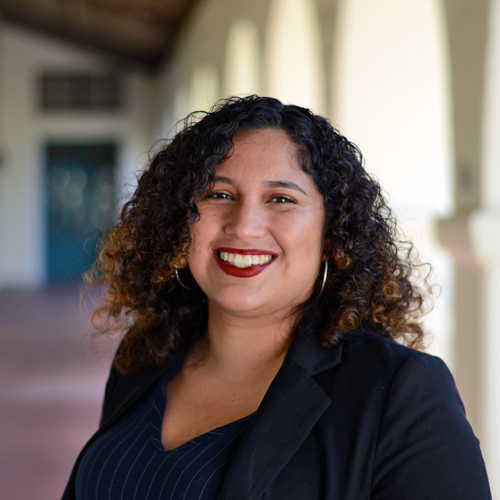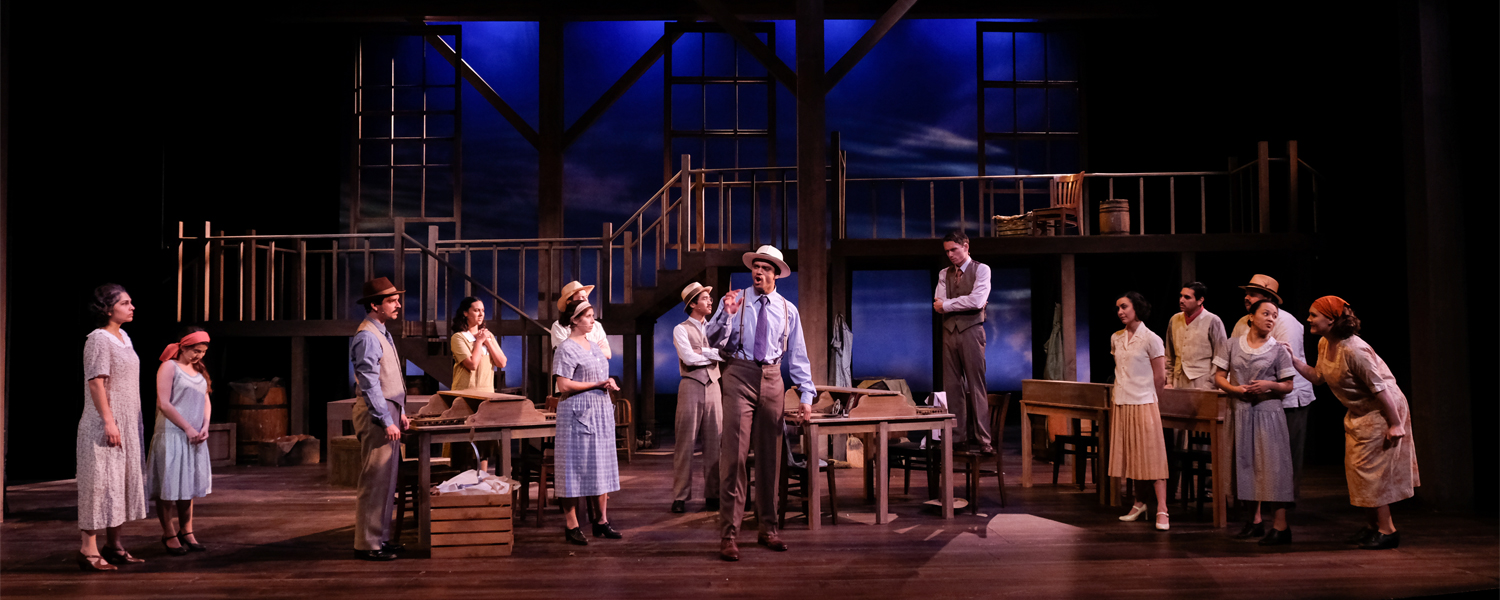
B.A. Musical Theatre
For students interested in musical theatre at SDSU, our B.A. in Musical Theatre combines excellent musical theatre training taught by Broadway professionals with the flexibility of taking many different classes within the School of Theatre, Television, and Film and throughout the university. We know that a successful career rewards diversity of experience and entrepreneurial thinking and we want to help you achieve your goals.
SDSU is a “SDSU a Top ‘Best Value’ College in Rankings Based on Cost of Attending and Future Earnings" according to the Wall Street Journal, and employers actively seek the skills offered by a theatre degree: creative thinking and problem-solving, collaboration, a goal-oriented approach to projects, superior communication skills, an ability to handle deadline pressures, effective time-management, and independent thinking and initiative.
SDSU is also home to the M.F.A. Program in Musical Theatre. This graduate degree is one of only a handful in the country where students learn the art of performing and teaching musical theatre. As an undergraduate performance major, you are taught not only by the faculty but also mentored by professional actors who are studying for their graduate degrees.
- Cal State Application Deadline is December 1
- Acceptd Application Deadline is December 31
Prospective students wishing to major in Musical Theatre or Theatre Arts (Performance) must audition. Students who wish to apply to SDSU with a General Theatre Arts emphasis are not required to audition. For SDSU, your Acceptd application takes the place of a live audition. There are no live auditions offered at SDSU.
For prospective BA Musical Theatre majors, the application is a two-step process:
- First, you need to apply to SDSU using the Cal State Apply application during the SDSU filing period between October 1- December 1. At the time of the application, select your Pre-Major as Musical Theatre (662509). Visit the Office of Admissions website for information about applying to the school.
- There is a non-refundable filing fee of $70 that must be paid at the time of your SDSU application.
- Next, you need to upload your audition through the Acceptd audition website platform between October 1- December 30. Choose “OPTION #2: BA Musical Theatre Only.” There you will be asked to upload the following:
- Resume
- Headshot
- An introduction “SLATE” video
- Two contrasting songs
- One monologue
- There is a non-refundable application fee of $35 that must be paid at the time of your Acceptd audition upload. If the $35 application fee is burdensome, there is a limited amount of scholarship assistance to help defray this cost. Please contact Robert Meffe for more information at [email protected].
If you want to be considered for BOTH the BA Musical Theatre and the BA Theatre Arts (Peformance) majors, the application is similar:
- First, you need to apply to SDSU using the Cal State Apply application during the SDSU filing period between October 1- December 1. At the time of the application, select your Pre-Major as Theatre Arts – Performance (662595). Visit the Office of Admissions website for information about applying to the school.
- There is a non-refundable filing fee of $70 that must be paid at the time of your SDSU application.
- Next, you need to upload your audition through the Acceptd audition website platform between October 1- December 30. Choose “OPTION #3: Both BA Theatre Arts (Performance) and BA Musical Theatre.” There you will be asked to upload the following:
- Resume
- Headshot
- An introduction “SLATE” video
- Two contrasting songs
- One contemporary monologue
- One classical or heightened language monologue (for monologue requirements see BA Theatre Arts (Performance) – How to Apply
- There is a non-refundable application fee of $35 that must be paid at the time of your Acceptd audition upload. If the $35 application fee is burdensome, there is a limited amount of scholarship assistance to help defray this cost. Please contact Robert Meffe for more information at [email protected].
SDSU is a member of the Musical Theater Common Prescreen (MTCP). The Musical Theater Common Prescreen is an agreed upon set of criteria used for the videos that are required as part of the application process to musical theater programs. These institutions settled on given guidelines to initiate a streamlined process for both applicants and schools as well as to promote inclusivity in the admittance process.
For more general information and tips visit Musical Theater Common Prescreen.
Prescreen Introduction "SLATE" Video
- Record one introduction "slate" video stating your name. If you would like to include your pronouns, state them as well. Please speak loudly (project your voice) and clearly (articulate) directly at the camera. This is an opportunity for the auditors to get a sense of your personality and to learn the pronunciation of your name.
- There is no need to slate your individual performance videos & pieces. Instead, clearly label each video with your name and the title of the piece you are performing (see more details below).
- This slate video should be no longer than 10 seconds.
Song Requirements
- One musical theater song from any time period.
- One song of your choice from any time period and in any style that best suits you (musical theater, pop, hip-hop, folk, rock, rap, soul, country, punk, etc.). This song should contrast the style of the first selection.
Song Tips
- Some examples of contrasting songs are fast tempo vs slow tempo, sustained melodic singing vs speech-like singing, dramatic vs comedic, belt vs head/falsetto mix.
- Many accompaniment tracks are available on YouTube and other websites. If you do not have a way to work with a live accompanist or don’t have access to a recorded track of your music, consider using an app that will play the piano part for you. Harmony Helper is one such app that allows you to take photos of your sheet music, upload them to the app and then generate a piano track that you can use.
Monologue Requirements
- One monologue from a published play or written by a professional writer. (A professional writer is someone whose plays have been produced, but may not have been professionally published.)
Monologue Tips
- Active monologues are often better for auditions; an active monologue takes place in real time and focuses on what you want and puts you in direct communication with an imaginary scene partner. This is often more successful in an audition situation than pieces that are a story or remembrance. Additionally, it can be helpful to avoid monologues that rely on extreme emotions as it can be hard to believably justify those responses in a short piece.
Dance Requirements
- No dance required.
Ballet Requirements
- No ballet required.
Optional Wild Card Video
- No optional wild card video required.
Labeling Guidelines for All Videos
Label each video file with the piece you are performing, the show or playwright, and your first & last name.
- Title of Song – Musical/Show – Your First & Last Name
- Title of Play – Playwright – Your First & Last Name
Examples:
- Slate – Pat Smith
- Your Daddy’s Son – Ragtime – Pat Smith
- Much Ado About Nothing – William Shakespeare – Pat Smith
Framing for Slates, Songs, and Monologues
- Camera framing is simply the placement and position of the actor in the shot. We recommend a waist up frame so we can see your face and hear you clearly.
Filming tips
- Solid-colored walls are ideal, but any background that does not steal the focus from your performance is desired.
- Before filming, do a trial run to test both your audio & visual presentation. Watch your video back to ensure everything looks AND sounds okay.
Time Guidelines for All Performance Videos
- All song and monologue videos are recommended to be between 60-90 seconds each.
Timeline
- December 1 – deadline to submit CalState Apply application
- December 30 – deadline to submit Acceptd audition
- Mid-February – faculty will make recommendation to admissions
- Mid-March – admissions will notify students of acceptance
- May 1- deadline to enroll
If you are denied admission based on your performance audition, you cannot apply to SDSU again until the following academic year.
For questions about the audition process, please contact:

For more information contact the Academic Advisor:

Stephanie Garibo Alday
Undergraduate Academic Advisor[email protected]DA 204B
The Theatre Arts major is an impacted program. Students are admitted as Musical Theatre pre-majors, and must complete the following requirements before advancing into the major:
Students must satisfy the following requirements before advancing from pre-major into the major:
- Muscial Theatre majors are required to participate in Musical Theatre Auditions each semester, attend callbacks, and perform as cast in Department productions
- THEA 111, 120, 130, 231, and 240 must be completed with a grade of C or higher
- THEA 111, 130, and 332 must be completed with a cumulative GPA of 3.0 or higher
- Check for prerequisites: You must have completed the prerequisites for the course for which you are registering
Preparation for the Major
- TFM 160 - Cinema as Art, 3 units
- THEA 111 - Voice and Movement, 3 units
- THEA 120 - Heritage of Storytelling, 3 units
- THEA 130 - Acting I, 3 units
- THEA 205 - American Musical on Stage & Screen , 3 units
- THEA 231 - Acting II, 3 units
- THEA 240 - Design and Technology for Theatre, 3 units
Major Upper Division Requirements
- THEA 325 - Script Analysis , 3 units
- THEA 350 - Musical Theatre Performance I , 3 units
- THEA 351 - Musical Theatre Performance II , 3 units
- THEA 450 - Musical Theatre Performance III , 3 units
- THEA 451 - Musical Theatre Performance IV , 3 units
- THEA 446A - Practicum in Performance (Running Crew-Sets, Lights), 2 units
- THEA 446B - Practicum in Performance (Running Crew-Costumes), 2 units
- THEA 446C - Practicum in Performance (Cast Member main season production or equivalent faculty-led experience), 2 units
- THEA 465 - Theatre of Diversity, 3 units
And nine units (9) to be selected from:
- THEA 320A - Advanced Voice & Text for Actors, 3 units
- THEA 332 - Acting III, 3 units
- THEA 335 Stage Management-Theory, 3 units
- THEA 359 - Directing I, 3 units
- THEA 431 - Workshop in Improvisational Acting, 3 units
- THEA 434 - Audition & Business Skills for the Actor, 3 units
- THEA 435 - Acting on Camera , 3 units
- THEA 460 A - History of Theatre, 3 units
- THEA 460 B - History of Theatre, 3 units
- THEA 515 - Playwriting, 3 units
- THEA 533A - Theories & Styles in Acting and Directing, 3 units
Dance Courses
A minimum of eight units in dance to be selected from:
- THEA 353 Musical Theatre Dance (may be repeated to fulfill the Dance requirement)
- THEA 355 Movement for the Theatre I
- DANCE 190 Somatic Movement Practices I
- DANCE 221 Ballet I
- DANCE 242 Dance Techniques I
- DANCE 243 Applied Dance Techniques
- DANCE 421 Ballet II
- DANCE 443 Applied Dance Techniques II
Music Courses
A minimum of three units in dance to be selected from
- MUSIC 105 Introduction to Elements of Music
- MUSIC 106A Introduction to Aural Skills I
- MUSIC 106B Introduction to Aural Skills II
- MUSIC 110A Piano - Elementary Class Instruction MUSIC 110B Piano - Elementary Class Instruction
For additional curriculum details, please consult the University Catalog.

